- Home
- Isuna Hasekura
Spice and Wolf, Vol. 4 Page 12
Spice and Wolf, Vol. 4 Read online
Page 12
Lawrence wavered, trying to decide whether to wake Holo.
He was unable to turn his gaze away from the yellowed page. Father Franz’s handwriting was neat, but at the same time, it seemed somehow excited.
“Is the Pope aware of this? If I am correct, then the God we worship triumphed without a fight. If that is proof of His omnipotence, how could I possibly remain calm?”
It seemed as though he could hear Father Franz’s decisive pen strokes.
The passage concluded: “I do not wish to let bias cloud my view of all the tales. Yet I cannot help but wonder if the pagans of the northlands themselves did not realize the importance of the Moon-Hunting Bear. No, perhaps the very fact that I am writing this means that I am already biased. As I assembled these books, I felt strongly the existence of these spirits. If possible, I hope that one would judge not with the narrow mind of a worshipper of our God, but rather with the open heart of those whose love of God is like a zephyr in an open field. That is why I have ventured to leave this book in among all the others.”
As soon as Lawrence flipped the piece of parchment over, the book’s story began, much like any of the other books he had read.
Should he let Holo read it first? Or should he pretend not to have seen it?
The thought flitted through his mind for a moment, but it was too late for that now—and in any case, it would be a kind of betrayal.
He decided to wake Holo.
He closed the book, whereupon he could hear a strange sound.
Plip, plip, plip-plip came the small, dry sound.
“…Rain, eh?”
But as soon as he said it, he realized the raindrops were awfully large. Eventually he realized that the sound was of galloping hooves.
It was said that the sound of a galloping horse at night would draw a throng of demons.
When traveling by horse at night, one could never let it run.
Church follower and pagan alike believed this.
But its true meaning was common sense—a galloping horse at night never brought good tidings.
“Hey, wake up.” Lawrence closed the book and tapped Holo’s shoulder, listening carefully.
Judging by the sound of the hooves, there was a single horse, which entered the village square and came to an abrupt stop.
“Mmph…what is it?”
“I have two things to tell you.”
“Neither good, no doubt.”
“First, I found the book with stories of the Moon-Hunting Bear.”
Holo’s eyes widened in an instant, and she looked at the book near Lawrence’s side.
But she was not the type to have her whole attention stolen by a single thing.
Her wolf ears flicked smartly, and she looked back at the wall behind them. “Did something happen?”
“That seems very likely. There is nothing less welcome than the sound of a horse’s gallop at night.”
Lawrence took the book and handed it to Holo.
She took it, but he did not let go.
“I don’t know what you plan to do upon reading this, but whatever thoughts you have, I’d like you to tell me about them.”
Holo did not look up, but gazed evenly at the book. “Hmph,” she replied. “I suppose you could’ve easily hidden this book. Very well. I promise.”
Lawrence nodded as he stood. “I’ll go look outside,” he said, walking away.
Naturally, the church was dark and quiet, though not so dark that Lawrence’s eyes were useless.
Once he arrived in the living room, there was a bit of moonlight filtering in through the cracks of the window, which improved visibility.
He could see well enough to be able to instantly identify the figure that was creaking its way down the stairs as Elsa.
“I heard the sound of a galloping horse,” she said.
“Any notion of what is afoot?”
He expected she did, otherwise she would not have come immediately downstairs.
“More than I’d like.”
A village like Tereo was too small for the hooves to be from a town lookout coming to warn of a mercenary attack.
It probably had something to do with Enberch.
But had the crisis not already passed?
Elsa trotted over to the window and peeked out through the crack as she had no doubt done many times in the past.
Unsurprisingly, the horse seemed to have stopped in front of the village elder’s house.
“I only know what I have been able to piece together, but judging from the papers on your desk, Enberch should not be able to strike, should they?” said Lawrence.
“A merchant’s eyes are keen indeed. But yes. I believe so myself. However—”
“If you are going to tell me that the situation would be different if I’d betrayed you, I should tie you up immediately.”
Unintimidated, Elsa looked sharply at Lawrence.
She soon looked away.
“In any case, I am a traveler. If things go badly, my position becomes very dangerous. There are scores of tales of merchants who became wrapped up in local problems and lost everything.”
“So long as I am here, I will not allow anything like that to happen. But please, go and close up the cellar. If there is trouble with Enberch, the village elder will certainly come here.”
“And what of the reason we are here so late at night?”
Elsa’s cleverness was different than Holo’s. Somehow Lawrence felt an affinity with the girl. “…Bring a blanket to the sanctuary.”
“Agreed. My companion is a nun, after all. No argument, then?”
Though Lawrence had only wanted to confirm their cover story, Elsa did not reply.
For if she had, she would have been telling a lie.
She was a clergywoman through and through.
“Elder Sem has come out,” said Elsa.
“Understood.” Lawrence turned and went to Holo.
In times like these, Holo’s keen ears were quite useful.
She had already returned most of the books to the cellar and put her robes back on.
“Take that one book with you. We’ll hide it behind the altar,” said Lawrence.
Holo nodded, handing the remaining books one by one to Lawrence, who had descended halfway down the stairs to the cellar.
“This should be all of them,” she said.
“Then take the hallway opposite the living room. If you continue around the corner, it should take you to the entrance behind the altar. Head in there, and take the book—”
Holo ran off without waiting to hear the end of the sentence.
Lawrence climbed out of the cellar, replacing the pedestal and putting the statue of the Holy Mother back on top of it.
He was nervous for a moment, unable to find the keyhole in the floor, but he managed to locate it, and after locking up with the brass key Elsa had given him, he gathered up the blanket and went after Holo.
Church construction was very similar the world over.
Just as he had expected, the entrance was there, its doors open.
He trotted down the narrow path that he knew should lead to the altar, protecting the candle flame with his hand. Soon his view expanded.
A few slivers of moonlight slipped past a window on the second floor, enough that Lawrence felt he did not need the candle.
On the other side of the doors that faced the altar he could hear quiet voices.
He motioned with his eyes to Holo—hurry!
It could be problematic to explain the key if it was found on them, so he hid it behind the altar as well.
They sat on the floor’s only indentation, the place where Father Franz had probably said his prayers for so many years.
Lawrence extinguished the candle and wrapped himself and Holo up in the blanket.
It had been some time since he’d acted so very like a thief outside the door.
Once long ago in a harbor town, he had snuck into a trading company’s building with a friend to peek at
the company’s order ledger.
At the time, he had not yet learned how to judge which goods were in demand. Thinking on the situation now, Lawrence realized it was a terrifying risk to take, although still much less so than what he was doing at this very moment.
After all, nothing he was doing in Tereo would make his coin purse any heavier.
The door opened, and Sem’s voice filled the room. “Still, as the village elder, I—”
Lawrence took a deep breath and looked up, dazed as though he had just woken from sleep.
“My apologies for disturbing your holy time in the church,” said Sem.
Behind him were Elsa and another villager wielding a wooden stave.
“Did something…happen?” Lawrence asked.
“I hope that as someone who has traveled much, you will understand. We may cause you some inconvenience for a time. Please bear with us.”
The villager wielding the staff took a step forward. Lawrence noted this and stood.
“I am a merchant who belongs to the Rowen Trade Guild. Many people in the guild’s house in Kumersun are aware that I have come to this village.”
The villager looked back at Sem, surprised.
If trouble was to arise with a trade guild, a village the size of Tereo could not hope to escape unscathed.
In terms of financial strength, a merchant guild was like a nation.
“Of course, Elder Sem, so long as you are taking appropriate actions as the representative of the village, then as a traveler I will certainly abide by them.”
“…I understand. But the reason I appear before you and your companion is not out of any malice, I assure you.”
“What has happened?”
The patter of more footsteps was heard; Evan had probably awoken.
Sem glanced in the direction of the footfalls, then looked back. He spoke slowly.
“Someone in Enberch has eaten the wheat of this village and died.”
CHAPTER FOUR
The first thing that came to Lawrence’s mind was a poisonous wheat known as Ridelius’s Hellfire.
If eaten, it rotted a victim’s limbs from the inside, and he or she would die screaming in agony. Even a small amount would cause terrible hallucinations and force a pregnant woman to miscarry.
The wheat was believed to come from demons who added fake black wheat to normal ears of wheat, and if it went unnoticed during the harvest and was ground into flour, it would become impossible to find.
No one would know the wheat was poison until someone ate it and developed symptoms.
To a farming village that raised wheat, its appearance was a calamity as bad as drought or flood.
The truly frightening thing about the wheat was not the suffering and death that it caused.
What made it so terrible was that when Ridelius’s Hellfire was discovered in a year’s harvest, none of the harvest could be eaten.
“And no one from our village has been poisoned?” asked Sem.
“I don’t think so, Elder. Grandma Jean is sick in bed, but it’s just a cold,” said a villager.
“The new wheat was used only to bake bread for the harvest festival, right? So at least we know the wheat we ground before that is safe.”
The large, flat rock in the village square seemed to be the place where the villagers met to discuss important matters.
The fire burned red as the sleepy-faced villagers rubbed their eyes and watched their leaders voice various opinions.
“Hakim said that a shoemaker ate bread made from wheat he bought from Riendott, then died. His limbs turned purple, and he suffered greatly. The Enberch Council soon found out that it was made with wheat from our village. Hakim rode back to Tereo right away, so he doesn’t know what happened after that, but we can guess. The feudal lord, Duke Badon, is sure to send a messenger to ensure the return of the wheat. We can expect an official envoy from Enberch at dawn, no doubt.”
“R-return the wheat…That means…”
At the innkeeper’s murmur, all gathered there in the circle fell silent.
It was Iima who finally spoke. She was one of the few women who had joined the gathering at the stone.
“It means we’ll have to return the money. Isn’t that right, Elder Sem?”
“…Yes.”
The villagers went pale at the pronouncement, clutching their heads.
Money used was money gone.
And most of the villagers did not seem likely to have been carefully saving their earnings.
There were a few, though, who did not clutch their heads in dread—Elder Sem, bar mistress Iima, and Elsa, along with the man who had delivered the letter to Sem during Lawrence’s first visit. And Lawrence and Holo, of course.
It was not because these people had savings or were especially brave, but rather because they were all capable of rationally thinking about the problem.
Seen from outside, it was a simple scenario to understand.
This wheat crisis was a play directed by Enberch.
“Elder, whatever shall we do? We’ve used the money to buy pigs and chickens and to repair our scythes and plows!”
“That’s hardly the whole of it. This year’s harvest was abundant, so our tavern laid in fine food and drink. If our money went into such purchases, that means yours did as well,” said Iima.
All who had drunk too much the night before now unavoidably hung their heads in regret.
Iima’s words only deepened their shame. She turned to Sem. “But, Elder—that’s not the only problem, is it?” Iima, the woman who had hauled a brewing pot about on her back, selling her ale as she traveled, was an imposing figure indeed.
“Indeed not. Once poison wheat is mixed in with the real wheat, the whole harvest is lost. This year’s harvest was great—but last year’s was not.”
Once wheat had been sown and harvested, bringing in triple the sown amount was acceptable. Quadrupling the amount was an excellent harvest. Once the next year’s seed grain was removed, the amount set aside in case of a poor harvest was limited.
It was possible that the villagers had already eaten last year’s reserve, having counted on this year’s good harvest.
In any case, the village’s food supply was in dire straits.
And they had no money with which to buy new wheat.
“What shall we do? Poverty is bearable but not starvation!”
“Indeed. However, I—” Sem was going to continue speaking, but he was interrupted when a man next to the innkeeper stood suddenly and pointed at Lawrence and Holo.
“They’re the ones who mixed poison wheat in with the harvest! I asked him, and he admitted to bringing wheat in! He’s here to ruin our harvest and then force us to buy his wheat!”
Lawrence had imagined this would happen.
He also knew that Sem had not brought him and Holo to the square out of malice.
The elder had known there was a good possibility that if Lawrence and Holo were absent, the villagers would take weapons in hand and go searching for them with suspicion and doubt in their hearts.
“Th-that must be it! He went to Evan’s all alone to grind his wheat! No, Evan’s in it with him, and they’re trying to destroy the village!”
“Aye, it’s Evan! Where did that lying miller scum go? Let’s tie them up together and make them tell us which wheat they poisoned!”
The villagers stood up one after another, ready to pounce on Lawrence.
Suddenly Elsa took a step forward and spoke. “Please wait.”
“This is no time for women to interrupt. Get back!”
“Excuse me?” Iima now stood beside Elsa; she was fully three times the size of the smaller girl. The men cringed, their spirits somewhat cowed.
Elder Sem cleared his throat as if to settle things for a moment. “Evan is in the church. We can assign blame later. What is important right now is the wheat that may be returned and the money they’re sure to ask for.”
“We can’t pay with money we don’t have! We
’ll have to ask them to wait until next…”
“If only it were so simple.”
The men were stunned at the elder’s words. “Elder, what…what do you mean?”
“Enberch will surely use this as an opportunity to restore the old arrangement,” he said.
“Surely not…”
The faces of the older men among the gathering were full of bitterness.
“What are you saying, Elder? Enberch isn’t allowed to do anything to this village! Father Franz has already made it so!”
Lawrence didn’t know whether Sem had not explained the nature of Enberch’s relationship to the village or whether the men simply didn’t want to understand it, but he soon found out.
“Anyway, we should never have allowed Elsa to inherit Father Franz’s position! Enberch will never respect that!”
“Quite so! She spends all day in that church, never once coming out to work the fields—though she eats her share of bread, ’tis sure. Everyone knows it was thanks to Lord Truyeo’s blessings that the harvest was so good this year. How could some church girl—”
“Enough!” said Sem.
Uncertainty only fanned the flames of discontent.
They burned from the driest, most flammable places, then spread from there.
It was easy for Lawrence to imagine how hard the serious Elsa had worked to preserve Father Franz’s legacy.
Having cooperated with her, Sem would likewise have understood.
But it was all too plain from the villagers’ words how they regarded the girl.
Lawrence noticed Elsa’s clenched fists and her expressionless face.
“What shall we do, Elder?” someone asked.
“In any case, each of us must check to see how much harvest money we have yet, as well as how many provisions we’ve laid in for winter. Until the Enberch messenger arrives, we don’t know what they’ll demand. They may arrive as soon as daybreak. We should adjourn until then—each of you go now, and check as I’ve told you to.”
Though the men’s sighs were heavy and dissatisfied, they reluctantly stood.
The gazes that Lawrence and Elsa endured as the men left the meeting stone were full of resentment.
Though the villagers were unreasonable, it was fortunate that Elder Sem seemed to be their ally.

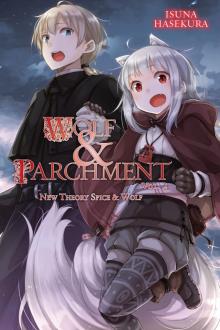 Wolf & Parchment, Volume 2
Wolf & Parchment, Volume 2 Wolf & Parchment, Volume 3
Wolf & Parchment, Volume 3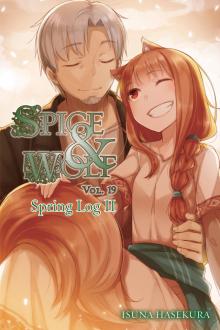 Spring Log II
Spring Log II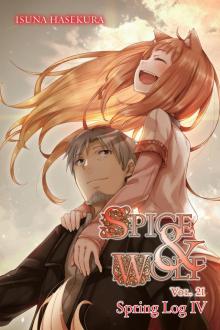 Spring Log IV
Spring Log IV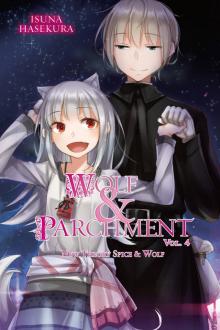 Wolf & Parchment: New Theory Spice & Wolf, Vol. 4
Wolf & Parchment: New Theory Spice & Wolf, Vol. 4 Spring Log III
Spring Log III Spice & Wolf IV
Spice & Wolf IV Spice & Wolf X (DWT)
Spice & Wolf X (DWT) Spice and Wolf Vol. 2
Spice and Wolf Vol. 2 Spice & Wolf XIII (DWT)
Spice & Wolf XIII (DWT) Spice and Wolf, Vol. 10
Spice and Wolf, Vol. 10 Spice & Wolf XVI (DWT)
Spice & Wolf XVI (DWT) Town of Strife I
Town of Strife I Spice and Wolf, Vol. 5
Spice and Wolf, Vol. 5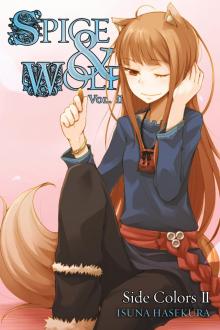 Side Colors II
Side Colors II Wolf & Parchment, Volume 1
Wolf & Parchment, Volume 1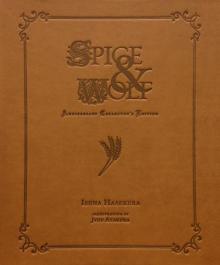 Spice & Wolf Omnibus
Spice & Wolf Omnibus Spice & Wolf XII (DWT)
Spice & Wolf XII (DWT)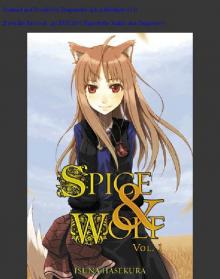 spice & wolf v3
spice & wolf v3 Spice & Wolf
Spice & Wolf Spice & Wolf VIII (DWT)
Spice & Wolf VIII (DWT) Spice and Wolf, Vol. 4
Spice and Wolf, Vol. 4 Spice & Wolf XIV (DWT)
Spice & Wolf XIV (DWT)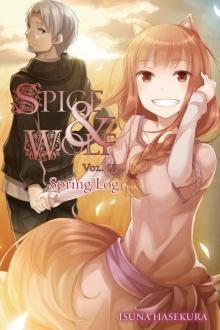 Spring Log
Spring Log Spice & Wolf III
Spice & Wolf III Spice & Wolf VII - Side Colors
Spice & Wolf VII - Side Colors Spice & Wolf XV (DWT)
Spice & Wolf XV (DWT) Side Colors
Side Colors Side Colors III
Side Colors III Spice & Wolf VI
Spice & Wolf VI Spice & Wolf IX (DWT)
Spice & Wolf IX (DWT) Spice & Wolf V
Spice & Wolf V Town of Strife II
Town of Strife II Spice & Wolf XI (DWT)
Spice & Wolf XI (DWT) Spice and Wolf, Vol. 12
Spice and Wolf, Vol. 12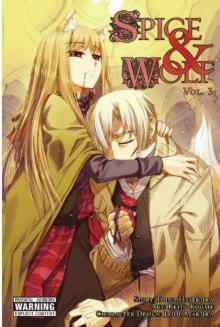 Spice and Wolf, Vol. 3
Spice and Wolf, Vol. 3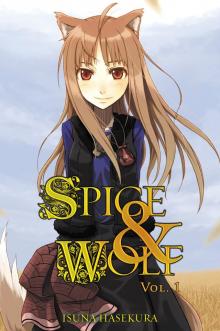 Spice and Wolf, Vol. 1
Spice and Wolf, Vol. 1 Spice & Wolf XVII (DWT)
Spice & Wolf XVII (DWT) Spice and Wolf, Vol. 6
Spice and Wolf, Vol. 6 Spice & Wolf II
Spice & Wolf II